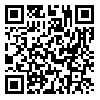BibTeX | RIS | EndNote | Medlars | ProCite | Reference Manager | RefWorks
Send citation to:
URL: http://ijme.tums.ac.ir/article-1-5491-en.html
2- Khalkhal Faculty of Medical Sciences, Ardabil University of Medical Sciences, Ardabil, Iran
Moral sensitivity is an attribute that enables people to recognize moral conflicts, forms their perceptions of complex situations, and makes them aware of the ethical consequences of their decisions. Moral decision-making and identification of related motives is an integral part of the nursing profession. Many factors are involved in nurses’ sensitivity to professional ethics, and the present study aimed to survey professional moral sensitivity and associated factors among the nurses in West Golestan province of Iran.This cross-sectional descriptive study was conducted in 2014 on 288 nurses employed in public health centers affiliated with West Golestan University of Medical Sciences through convenience sampling. Research instrument was a demographic data questionnaire and the Moral Sensitivity Scale for Nurses. Data were analyzed by SPSS 16. Descriptive statistics and a significance level of P<0.05 were used for data analysis.A total of 229 (79.5%) of the study subjects were female. The mean age of the study population was 31.2 ± 6.4 years, and their moral sensitivity score was 63.48 ± 13.9. The level of moral sensitivity was reported as low in 51 subjects (17.7%), moderate in 182 subjects (63/2%), and high in 53 subjects (18/4%). The highest rating pertained to application of professional knowledge (mean rank=4.83). Results of the Spearman correlation test showed a significant relationship between the nurses’age and their professional moral sensitivity (r=0.152, P=0.005). Moreover, the Mann-Whitney U test showed a significant difference between nurses’ professional moral sensitivity and history of participation in ethics workshops (P=0.001).The moral sensitivity of nurses in West Golestan province was established as moderate, indicating the importance of attention to professional ethics and raising nurses’ awareness of sensitive moral issues related to their profession.
Received: 2015/02/11 | Accepted: 2015/09/2 | Published: 2015/09/6
| Rights and permissions | |
 |
This work is licensed under a Creative Commons Attribution-NonCommercial 4.0 International License. |





